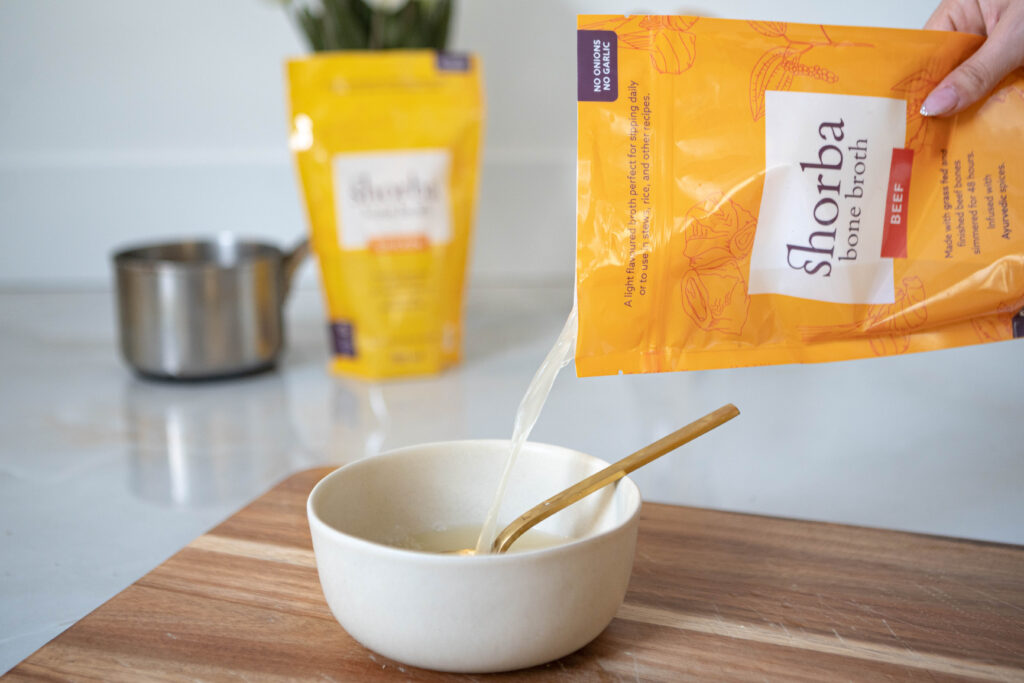How Beef Broth Supports Holistic Health: What to Know
Wiki Article
The Ultimate Guide to Making and Appreciating Organic Bone Broths in your home
Bone brew has actually obtained focus for its various health and wellness advantages and cooking convenience. Crafting natural bone brew in your home permits people to control the top quality of active ingredients, guaranteeing a nutritious end result. Comprehending the option of bones, vital flavor components, and correct cooking methods is vital. As the procedure unravels, one may question how to boost their broth beyond the basics and integrate it into daily meals for boosted flavor and nourishment.Comprehending the Wellness Benefits of Bone Broth
Although bone brew has been a staple in different cuisines for centuries, its health and wellness advantages have gained considerable interest recently. Rich in collagen, amino acids, and minerals, bone broth is commonly promoted for its prospective to sustain joint health and wellness, boost gut function, and boost skin flexibility. The gelatin originated from cooked bones might help digestion and aid seal the digestive tract lining, possibly reducing concerns like leaky gut syndrome.Furthermore, the presence of nutrients such as glucosamine and chondroitin may contribute to decreased swelling and pain alleviation in joints. Furthermore, bone broth is moisturizing and can act as a nourishing base for soups and stews. Lots of proponents additionally claim that it increases the immune system, thanks to its mineral account. On the whole, the rebirth of rate of interest in bone brew is connected to its perceived capability to promote general well-being and support different physical features.Selecting the Right Bones for Maximum Flavor and Nutrition
What factors should one take into consideration when choosing bones for brew preparation? The kind of bones made use of significantly affects both taste and nutritional worth. First, it is important to choose bones that include a mix of marrow bones, joint bones, and meaty bones. Marrow bones supply healthy and balanced fats and rich flavors, while joint bones contribute collagen, boosting the brew's nutritional profile.Additionally, sourcing bones from pasture-raised or grass-fed pets warranties better and even more nutrients, as these animals are commonly healthier. The quality of the bones is also important; picking bones from local butchers or farmers' markets can guarantee perfect taste. Bone size matters also; bigger bones release more jelly, leading to a richer broth. Considering the type of animal-- fish, beef, or chicken-- can affect the last preference, allowing for versatile broth choices customized to specific preferences.Crucial Components for a Delicious Bone Broth

Quality Bone Selection
The structure of a savory bone brew hinges on the mindful choice of top quality bones. Sourcing natural, pasture-raised or grass-fed bones is important, as these choices are more probable to be devoid of hazardous additives and provide remarkable nutrients. Selections such as hen, lamb, or beef bones each impart distinctive flavors and health and wellness benefits. Bone kinds, consisting of marrow bones, knuckle bones, and oxtails, add jelly and collagen, enhancing the broth's appearance. Picking bones with a mix of meat and connective tissue can likewise add splendor and depth. In addition, selecting bones with noticeable marrow ensures a nutrient-dense broth, elevating the total top quality. Eventually, spending time in quality bone option prepares for a delicious and beneficial broth.Aromatic Taste Boosters
Picking high-quality bones sets the stage for a nutritious and rich bone broth, yet it is the addition of fragrant taste boosters that absolutely elevates the dish. Components such as onions, garlic, and carrots not just impart sweet taste yet also contribute deepness to the brew. Fresh herbs like parsley, thyme, and bay leaves include an aromatic note, while seasonings such as black peppercorns and cloves introduce warmth and complexity. Furthermore, including a splash of apple cider vinegar can help extract minerals from the bones, improving the broth. These flavor boosters create an unified blend, changing a straightforward brew right into a mouthwatering structure for sauces, stews, or soups, making it a flexible component in any type of culinary collection.Step-by-Step Overview to Making Bone Brew at Home
Developing bone broth in your home can be a satisfying cooking endeavor that enhances both flavor and nutrition in different dishes. To start, one should pick high-quality bones, preferably from grass-fed or organic sources. Toasting the bones at 400 ° F for concerning half an hour can intensify the taste. Next, transfer the baked bones to a big pot or slow stove and cover them with cool water. Adding a dash of vinegar assists remove minerals from the bones.Include fragrant veggies like onions, carrots, and celery for included depth, along with natural herbs and spices as wanted. Bring the mixture to a boil, after that reduce to a simmer. It is necessary to allow the broth simmer for a minimum of 12 hours, though longer is more suitable for maximum richness. Lastly, stress the broth with blog here a fine-mesh filter and shop it in closed containers, ready to raise meals with its nutritious significance.
Tips for Refining Your Bone Brew Simmer
While simmering bone brew, preserving the ideal temperature and timing is crucial for attaining a abundant and tasty result. A mild simmer, ideally in between 190 ° F and 210 ° F, assists essence maximum nutrients and tastes without steaming, which can make the broth cloudy. It is advisable to monitor the pot carefully, readjusting the warm as required to preserve this simmer.Timing is also essential; a longer simmer, generally varying from 12 to two days, allows for deeper flavor removal and collagen release. For hen bones, a 12 to 24-hour simmer suffices, while beef bones profit from longer cooking times.Additionally, skimming off any type of foam or pollutants that increase to the surface area throughout the first couple of hours can improve the broth's clarity and preference. Making sure the pot is covered during simmering aids to keep dampness and increase the flavors, making for an extra gratifying end product.Imaginative Ways to Utilize Bone Brew in Your Cooking
Including bone broth into numerous meals raises both taste and nutritional value. Cooks and home chefs alike locate that making use of bone brew as a base for soups and stews boosts depth and splendor, transforming basic recipes right into passionate dishes. It can also be utilized in risottos, where the brew changes water, enabling the grains to absorb its full-flavored essence.Additionally, bone broth offers as an exceptional cooking fluid for grains like quinoa or rice, infusing them with nutrients and taste. For an included twist, it can be utilized in braising meats, causing tender, delicious outcomes. Also sauces gain from a sprinkle of bone brew, enriching their preference profile.Moreover, bone broth can be integrated right into smoothies for an unanticipated health increase, giving healthy protein and nutrients without compromising preference. These imaginative applications showcase the flexibility of bone broth find more information in everyday cooking, making it a vital cooking area staple.Keeping and Protecting Your Self-made Bone Broth
Correct storage space and conservation of homemade bone broth is vital for keeping its flavor and dietary advantages. Freezing techniques and refrigeration ideal practices play an important role in expanding the broth's service life. Understanding these methods can assist guarantee that the broth continues to be safe and tasty for future usage.

Freezing Methods Discussed
Freezing techniques are necessary for efficiently saving and preserving self-made bone brew, guaranteeing its abundant flavors and nutrients continue to be intact for future usage. To ice up bone broth, it is recommended to allow it trendy entirely before moving it to storage containers. Glass jars, silicone mold and mildews, or sturdy freezer bags are ideal options. When utilizing containers, leave space at the top for expansion during cold. Portioning the broth right into smaller amounts permits for very easy thawing and reduces waste. Label containers with the day and materials for easy recognition. For peak high quality, consume the frozen brew within 3 to six months - Benefits Of Bone Broth. Thawing can be performed in the fridge or by using a microwave, making sure that the broth is warmed thoroughly prior to consumptionRefrigeration Best Practices
While lots of focus on cold as an approach of preservation, refrigeration additionally plays a necessary role in keeping homemade bone brew properly. As soon as cooled, great site bone brew need to be transferred to closed containers, guaranteeing very little air direct exposure to stop wasting. It is a good idea to cool broth within two hours of cooking to maintain its top quality. Typically, homemade bone broth can be kept in the fridge for approximately five days. Labeling containers with dates can help track quality. For peak taste and safety, broth must be reheated to a rolling boil prior to usage. If longer storage is required, cold stays an outstanding choice, however correct refrigeration techniques ensure that bone broth remains nourishing and scrumptious for temporary usage.Frequently Asked Questions
Can I Utilize Frozen Bones for Making Bone Brew?
The inquiry of utilizing icy bones for bone brew emerges frequently (Beef Broth). Experts concur that icy bones can be made use of properly, yet they should be thawed before cooking to guarantee suitable taste and nutrient extractionFor How Long Can I Shop Homemade Bone Broth?

Is It Safe to Reheat Bone Brew Several Times?
Reheating bone broth several times can pose safety and security issues - Beef Broth. Each reheating cycle enhances the threat of microbial growth. It is recommended to reheat only when and keep any type of leftovers quickly to guarantee security and qualityCan I Add Vegetables to the Brew for Flavor?
Including veggies to brew enhances taste and nutritional value. Usual selections consist of carrots, onions, and celery. The vegetables infuse their essence into the brew, creating a richer and a lot more mouthwatering final item.What's the very best Means to Defrost Icy Bone Broth?
To thaw frozen bone broth, one can put it in the fridge over night, use a microwave on low warmth, or immerse the secured container in cozy water, ensuring even defrosting without compromising taste or nutrients. It is important to choose bones that include a mix of marrow bones, joint bones, and meaningful bones. Marrow bones supply healthy fats and abundant tastes, while joint bones contribute collagen, enhancing the broth's dietary profile.Additionally, sourcing bones from grass-fed or pasture-raised animals warranties higher top quality and more nutrients, as these animals are generally much healthier. Bone types, including marrow bones, knuckle bones, and oxtails, add jelly and collagen, boosting the broth's appearance. Selecting top notch bones establishes the phase for a nourishing and rich bone broth, however it is the addition of fragrant flavor enhancers that absolutely boosts the meal. Also sauces profit from a dash of bone broth, enhancing their taste profile.Moreover, bone brew can be included right into healthy smoothies for an unexpected wellness increase, supplying healthy protein and nutrients without compromising taste.Report this wiki page